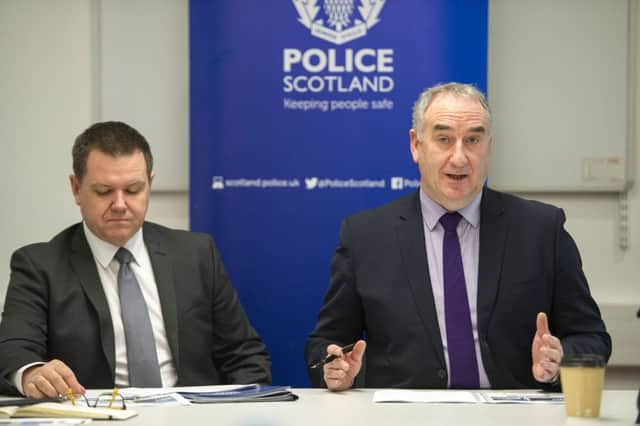Chris Marshall: Ruaraidh Nicolson out of his comfort zone


Mr Nicolson was appearing before Holyrood’s justice committee to give evidence after Police Scotland was found to have flouted guidelines in its attempts to unmask a journalist’s source.
Late last year, the Interception of Communications Commissioner’s Office (Iocco) ruled that Police Scotland had contravened data rules when it attempted to find the source of a leak from the Emma Caldwell murder inquiry.
Advertisement
Hide AdAdvertisement
Hide AdAn uncomfortable-looking Mr Nicolson yesterday told MSPs he would “rather not be here” and said he would make sure the same mistakes would not happen again.
In fact, the assistant chief constable was never meant to appear in front of the committee at all. The committee had initially called four officers involved in the application for mobile phone data which would reveal the name of the journalist’s source.But Police Scotland has refused to allow those officers – whose names are already in the public domain – to appear, claiming that to do so would put them at risk and could prejudice a possible investigation by the Investigatory Powers Tribunal.
Last week, the force’s head of legal services admitted in a letter to MSPs that senior officers were aware of changes to data interception guidelines in the weeks before they were broken. Senior figures saw new guidance in February before Detective Superintendent David Donaldson “misinterpreted” the new code 22 days after it came into effect on 25 March.
Iocco found Police Scotlandwas “reckless” in using the Regulation of Investigatory Powers Act to obtain details of a journalist’s source without getting permission from a judge.
Yesterday, Mr Nicolson told MSPs the decision to press ahead with the application had been made despite warnings from a detective superintendent.
He said the senior responsible officer had provided guidance that applications relating to journalistic sources were likely to breach the code. Yet the force ploughed on, based on what Police Scotland has described as Det Supt Donaldson’s “misinterpretation” of the guidelines.
The whole issue will now be investigated by HM Inspectorate of Constabulary in Scotland (HMICS) which is carrying out an assurance review of Police Scotland’s counter-corruption practices.HMICS said that while its review will not re-examine the findings of Iocco, it will look at the wider investigation conducted by Police Scotland into the circumstances which gave rise to the applications.
Almost forgotten in all of this is that officers are continuing to investigate the 2005 murder of Emma Caldwell.
Advertisement
Hide AdAdvertisement
Hide AdMr Nicolson admitted yesterday that officers began searching for the leak in their investigation in April last year – a month before the Lord Advocate, Frank Mulholland, ordered the case be re-investigated.
Ms Caldwell, 27, had been working as a prostitute when her body was discovered in woods near Biggar more than ten years ago.
The Crown’s decision to ask police to re-investigate the case followed media reports that police dropped their case against a local suspect in favour of prosecuting four Turkish men.
Just as the Caldwell family’s search for justice has gone on and on, so it seems the fallout from Police Scotland’s search for a leak in the investigation looks set to run for some time yet.